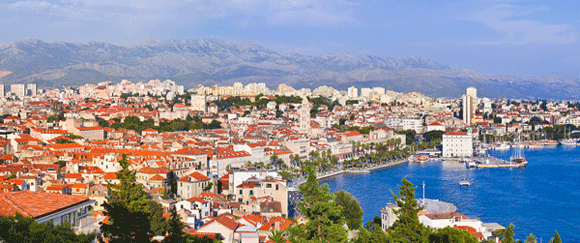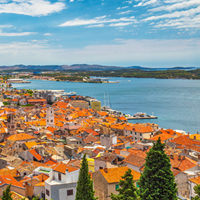Digital Nomad Life in Split, Croatia
Summary: Digital nomads and expats talk about what it is like to live in Split, Croatia. Get tips from others living in Split about where to live, how to find a place to live, pros and cons of living in Split and more.

Where should I live in Split?
We asked digital nomads and expats how they chose their neighborhood and found a place to live. They answered:
"Finding a place to live in Split involves several steps. First, you need to determine your budget and the type of accommodation you're looking for. This could range from a small apartment to a larger house, depending on your needs and financial situation. Next, you should research different neighborhoods in Split to find one that suits your lifestyle and preferences. Some popular areas include the Old Town, Bacvice, and Marjan. Consider factors such as proximity to work or school, access to public transportation, safety, and the presence of amenities such as shops, restaurants, and parks. Once you have a clear idea of what you're looking for, you can start your search. There are several online platforms where you can find listings for rentals in Split, such as Njuskalo, Crozilla, and Indomio. These websites allow you to filter results based on your criteria, and you can contact landlords or agents directly through the platform. Another option is to work with a real estate agent. They can help you navigate the local market, arrange viewings, and negotiate contracts. However, keep in mind that you'll likely have to pay a commission for their services. When you find a place you're interested in, arrange a viewing to see it in person. This is also a good opportunity to ask questions about the property and the terms of the lease. Make sure to check the condition of the property and ensure that all appliances and systems are in working order. Once you've found a place you like, you'll need to sign a lease agreement. This will typically require you to pay a deposit, usually equivalent to one or two months' rent. Make sure to read the contract carefully and understand all the terms before signing. Finally, once the lease is signed and the deposit is paid, you can move into your new home in Split," said one expat who made the move to Split.
What do people appreciate most about the culture in Split?
"Expats in Split often appreciate the relaxed pace of life, known as 'pomalo' lifestyle, where locals take time to enjoy the simple things in life. They also value the strong sense of community and family ties that are deeply ingrained in the local culture. The local cuisine, which is a blend of various Mediterranean influences, is another aspect that expats enjoy. They also appreciate the locals' hospitality and friendliness towards foreigners. The rich history and well-preserved architecture of Split is another aspect that expats find fascinating. Lastly, the beautiful natural surroundings, including the Adriatic Sea and numerous islands, are highly appreciated by expats living in Split," remarked one foreigner who made the move to Split.
What do people find most challenging about the culture in Split?
"Expats in Split often find the language barrier to be the most challenging aspect of the local culture, as Croatian is a difficult language to learn and not everyone speaks English. They may also struggle with the slower pace of life, which can be frustrating when trying to get things done quickly. The bureaucracy can be quite complex and time-consuming, which can be particularly challenging for those used to more efficient systems. Some expats may find it difficult to integrate into the local community, as Croatians can be reserved and it can take time to build relationships. The cultural differences in communication style can also be challenging, as Croatians tend to be more direct and straightforward than people from some other cultures. Lastly, the high level of smoking in public places can be a challenge for those who are not used to it," remarked one member in Split.
What residency documents or visas did I need if I will be in Split for a while?
"If you are planning to stay in Split for a period longer than 90 days, you will need to apply for a temporary residence permit. This can be done at the local police station in Split. The documents you will need for this application include a valid passport, proof of health insurance, proof of sufficient funds to support yourself during your stay, and a reason for your stay such as work, study, or family reunification. If you are planning to work in Croatia, you will also need a work permit. This is usually obtained by your employer in Croatia. For non-EU citizens, a visa may be required to enter Croatia. This depends on your nationality and can be checked on the website of the Ministry of Foreign and European Affairs of the Republic of Croatia. Please note that the requirements can change and it is always best to check the most current information with the Croatian embassy or consulate in your home country," said one person in Split.
 PassportCard Expat Health Insurance
PassportCard Expat Health InsuranceGet Quote
Never worry about paying your medical bills out of pocket again. The innovative PassportCard allows for a stress-free experience for all expat families, remote travelers, and workers. With a 24/7 customer service and an outstanding customer base of over 2 Million clients, it will feel like medical care at home. Get up to 10% off on your policy now.
 PassportCard Expat Health Insurance
PassportCard Expat Health InsuranceNever worry about paying your medical bills out of pocket again. The innovative PassportCard allows for a stress-free experience for all expat families, remote travelers, and workers. With a 24/7 customer service and an outstanding customer base of over 2 Million clients, it will feel like medical care at home. Get up to 10% off on your policy now.
Get Quote
What cultural blunders should I try to avoid making in Split?
We asked people in Split if they could share any humorous cultural blunders they commited. They wrote:
"In Split, it's considered rude to rush or push past people, so always take your time and be patient. Avoid discussing sensitive topics such as the Yugoslav Wars, as this can be seen as disrespectful. It's also important to respect the local customs and traditions, such as removing your shoes when entering someone's home. Don't assume everyone speaks English, even though many Croatians do speak it fluently. Try to learn a few basic phrases in Croatian to show respect for the local language. Avoid being overly loud or boisterous in public places, as Croatians generally value modesty and discretion. When dining out, don't leave without paying your share of the bill, as this is considered very rude. Also, tipping is customary in Croatia, so be sure to leave a tip for good service. Finally, Croatians are very proud of their country and culture, so avoid making negative comments or comparisons to other countries," said one person in Split.
 AGS Worldwide Movers
AGS Worldwide MoversGet Quote
Relocating abroad soon? Make your move with AGS! AGS Worldwide Movers is a leader in the international moving industry. Our experience and expertise allows us to guarantee our clients the best quality moving services.
 AGS Worldwide Movers
AGS Worldwide MoversRelocating abroad soon? Make your move with AGS! AGS Worldwide Movers is a leader in the international moving industry. Our experience and expertise allows us to guarantee our clients the best quality moving services.
Get Quote
About the Author
 Betsy Burlingame is one of the founders of Digital Nomad Exchange and the Founder and President of Expat Exchange. She launched Expat Exchange in 1997 as her Master's thesis project at NYU. Prior to Expat Exchange and Digital Nomad Exchange, Betsy worked at AT&T in International
and Mass Market Marketing. She graduated from Ohio Wesleyan University
with a BA in International Business and German.
Betsy Burlingame is one of the founders of Digital Nomad Exchange and the Founder and President of Expat Exchange. She launched Expat Exchange in 1997 as her Master's thesis project at NYU. Prior to Expat Exchange and Digital Nomad Exchange, Betsy worked at AT&T in International
and Mass Market Marketing. She graduated from Ohio Wesleyan University
with a BA in International Business and German.
Some of Betsy's articles include 12 Best Places to Live in Portugal, 7 Best Places to Live in Panama and 12 Things to Know Before Moving to the Dominican Republic. Betsy loves to travel and spend time with her family. Connect with Betsy on LinkedIn.

AGS Worldwide Movers can move you to and from anywhere in the world.
Get Quote
 Digital Nomad Visa for Croatia
Digital Nomad Visa for Croatia
Learn about the Digital Nomad Visa for Croatia and what is involved in obtaining one. This is one of the most important aspects of moving to Croatia as a digital nomad.
![]() Croatia Forum
Croatia Forum
Talk with other digital nomads and expats in Croatia on our Croatia forum - meet people, get advice and help others.
![]() Contribute
Contribute
Help others in Croatia by answering questions about the challenges and adventures of living in Croatia.
Digital Nomads in Croatia offer advice about healthcare, hospital visits, emergency rooms visits, finding a doctor and buying health insurance in Croatia.



